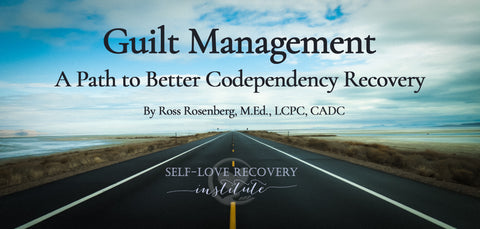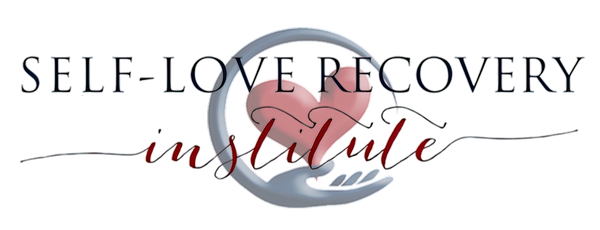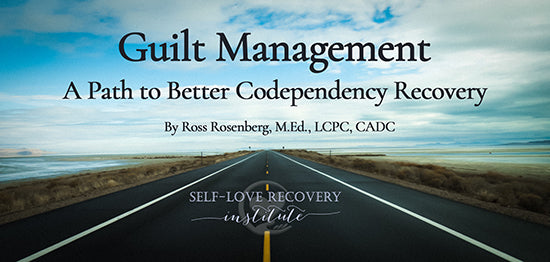
Written by Ross Rosenberg, M.Ed., LCPC, CADC
Self-Love Recovery Institute – President/CEO
Psychotherapist, Educator, Author, Expert Witness
As a psychotherapist and recovering codependent, I have come to understand the toxic and antithetical influence that guilt has on a Self-Love Deficient (SLD)/Codependent seeking recovery. Although there are many facets of Self-Love Deficit Disorder (SLDD)/Codependency that all need therapeutic support and guidance, the propensity of falling victim to guilt trips is one of the big ones. Since SLDs/codependents lack self-esteem and often have tenuously developed positive self-concepts, they are prone to the manipulative tactics of Pathological Narcissists.
Pathological narcissists, especially covert narcissists, control their SLD/codependent partners by keeping them trapped in their web of self-serving manipulation. The covert narcissist uses power and control dynamics to render their SLD/codependent partner powerless, without feelings of personal efficacy and potential to be independent or interdependent partners. They wield the guilt trip like a weapon but are always hidden or invisible and free from detection. This makes this passive-aggressive adversary much more dangerous than its overtly aggressive counterpart.
The passive-aggressive covert narcissist not only weaponizes their guilt-tripping prowess, but they also simultaneously play the victim. They skillfully and precisely utilize the guilt trip as a laser-guided weapon that is designed to make the SLD/codependent feel guilty and anxious and further neglect their own needs, while desperately trying to make the narcissist happy. Ultimately, the narcissist pushes their selfish needs to the forefront, while gaslighting their SLD/codependent partner to believe that their needs are unimportant, and by asking for them to be met, they are being needy or selfish.
Covert narcissists are as much of a bully, if not worse, than overt narcissists. They have perfected a form of bullying that is invisible to everyone else except the fear-based and insecure SLD/codependent partner. Whether it is a slight shift in their vocal tone, facial expression, body language, or self-deprecating remarks, all have the same effect—to coerce their SLD/codependent partner into complying with their demands, needs, and wants. Or, in other words, to comply with their insatiable narcissistic demands. The bullying renders the codependent powerless, exacerbating their foundational feelings of anxiety, fear of being hurt, and/or abandonment.
However, these narcissists, like other bullies, are just plain cowards. They target the easily manipulated and gaslit SLD/codependent, who they can turn against themselves to satisfy their own selfish needs. Much like a perpetrator of child sexual abuse, the covert narcissist seeks the perfect victim, one who doesn’t have the self-esteem to stand up for themselves, the experience to set boundaries, and who is likely to be disbelieved amongst their friends and followers.
If you find yourself in a relationship with a covert narcissist, it can be extremely difficult to escape. Covert narcissists are masters of manipulation and control, and they will do everything in their power to keep you under their thumb.
Here are five tips on how to break free from a covert narcissist:
1. Recognize the signs of narcissistic abuse.
Covert narcissists are often very masterful at flying under the radar. They may seem charming and loving at first, but over time their true colors will begin to show. If you notice that your partner is always putting you down, gaslighting you, or making you feel like you're crazy, these are all red flags that you may be in an abusive relationship with a covert narcissist.
2. Observe Don’t Absorb.
The Observe Don’t Absorb technique allows the SLD/codependent to maintain control. I call it Observe Don’t Absorb because I teach my clients to artificially detach from the narcissist.
The goal is for the SLD/codependent to simply watch or observe the narcissist. As they do, they are not connecting effectively or emotionally to them. They are simply observing.
Conversely, when they absorb, they are participating in the dysfunctional interaction and end up losing control, making it so they can no longer properly protect themselves or set healthy boundaries.
In essence, this is a healthy dissociation. It is purposeful emotional detachment, and it helps neutralize the narcissist’s power to control them.
With this technique, we refuse to allow the manipulator to get under our skin. We won’t absorb the toxins and cannot be pulled into their emotional world to become a victim of it.
It is as if we picked up a bottle of poison. There is no danger in holding or looking at a bottle of poison. But the moment we pop off the lid and ingest it, we are doomed. We respect its pathological power, but we are not tainted by it.
3. Establish a support system.
One of the best things you can do when attempting to break free from a covert narcissist is to establish a strong support system of friends and family members who can offer you emotional stability and help hold you accountable to your boundaries. These people can provide you with a much-needed reality check when the narcissist is trying to gaslight or manipulate you.
4. Seek professional help.
If you find yourself struggling to break free from a covert narcissist on your own, it may be helpful to seek out professional help from a therapist or counselor who can assist you in dealing with the emotional fallout of this type of abuse.
5. Create a safety plan.
If you are in an abusive relationship with a covert narcissist, it's important to have a safety plan in place in case things take a turn for the worse. This may include having a safe place to go if things get physical, having someone you can call for support, and making sure you have access to financial resources in case you need to leave the narcissist suddenly.
Ross Rosenberg M.Ed., LCPC, CADC, is Self-Love Recovery Institute’s CEO and primary contributor. His internationally recognized expertise includes pathological narcissism, narcissistic abuse, and attachment trauma. Ross’s “Codependency Cure™ Treatment Program provides innovative and results-oriented treatment.
Ross's expert educational and inspirational seminars have earned him international acclaim, including his 22 million YouTube video views and 236K subscribers. In addition to being featured on national TV and radio, his “Human Magnet Syndrome” books sold over 150K copies and are in 12 languages. Ross provides expert testimony/witness services.
More about Ross and his educational and inspirational work can be found at www.SelfLoveRecovery.com.
Join us on Facebook, Instagram, Twitter, and now TikTok!
https://www.facebook.com/TheCodependencyCure
https://www.instagram.com/rossrosenberg_slri
https://www.twitter.com/rossrosenberg1
https://www.tiktok.com/@rossrosenberg1


0 comments